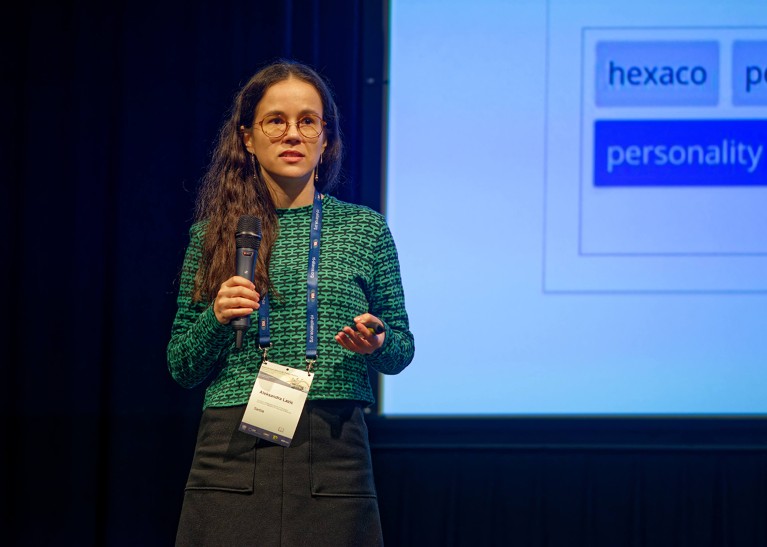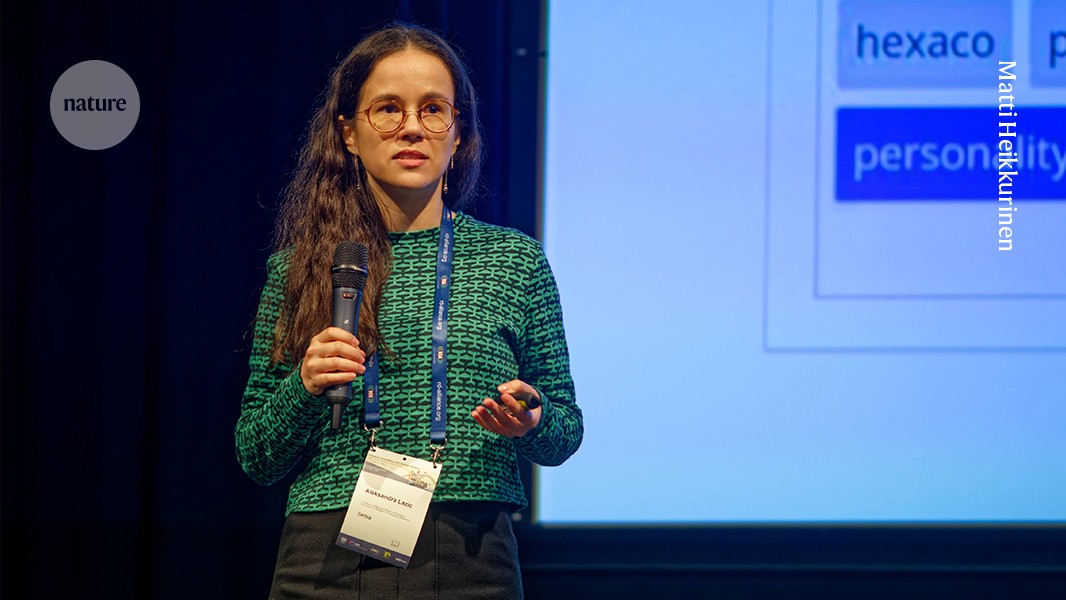
Aleksandra Lazić helped to compile an open-access repository of social-science questionnaires, many of them translated or culturally adapted for use in Serbia.Credit: Matti Heikkurinen
I was just beginning my PhD when my supervisor gave me my first assignment. She wanted me to gather and organize the social-science questionnaires — called instruments — that our laboratory uses for data collection. It sounded like one of those boring administrative tasks that no one else would take on, but I understood why it was needed.
As you’d expect from a psychology research group, our lab at the University of Belgrade makes heavy use of questionnaires. Our team members have diverse research interests and backgrounds, and the questionnaires are used to measure everything from personality traits and belief in conspiracy theories to cognitive biases and symptoms of trauma.
Although some of these instruments were created by my fellow lab members and other local researchers, most originated in Western countries and had to be translated and often culturally adapted for use in Serbia.
We wouldn’t be the first to compile such tools, and painstakingly translating 100 questions, only to find that someone has already done it, doesn’t feel great — trust me. But other efforts had mostly focused on English-language content and were locked behind paywalls or limited to a specific subfield of psychology. Our collection would thus serve as a valuable resource for researchers in my country, bridging an accessibility gap for tools that are readily available in the West.
Serbia is rethinking science — but the reforms could cost hundreds of jobs
In March 2020, the collection went live. The Repository of Psychological Instruments in Serbian, known as REPOPSI, is a centralized, open-access repository — a place to store, share and organize questionnaires, mainly those adapted into Serbian or developed by Serbian scientists. It provides a good starting point for any psychology research project inside or outside the country. But REPOPSI also increases the visibility of scientific contributions from a region that is typically under-represented in the field. And it has transformed my PhD career.
Over the next five years, REPOPSI would grow from around 100 to more than 250 questionnaires (many available in both Serbian and English); win a €50,000 (US$55,000) grant from the European Open Science Cloud Future project and the global community-driven Research Data Alliance (RDA); and receive a commendation from the Society for the Improvement of Psychological Science. I personally have given talks and workshops about REPOPSI, and in 2024 received the RDA’s Sarah Jones Award for ‘exceptional contribution to fostering collaboration in open science’, mostly in recognition of my work on the project.
Here are some practical lessons I’ve learnt over the past five years.
Imperfect is OK
If open science is done transparently, it doesn’t have to be done perfectly. You can always refine as you go.
When REPOPSI launched in 2020, I knew neither its limitations nor what it might be missing. Once it went public, however, my colleagues and I got feedback from users and experts on technical aspects and user experience, which we incorporated to improve the service. And, because we had thoroughly documented everything, we were able to build on what was already there once we obtained funding.
Peer-review activists push psychology journals towards open data
This is most apparent in our approach to file formats. We initially stored questionnaires as Microsoft Word files, but three months later we switched to Open Office and Adobe PDF. These ‘open’ file formats are accessible to everyone, without the need for proprietary software. Three years later, we transitioned our questionnaire metadata to XML. As a result, our resource is more broadly usable by researchers and machines alike.
Lean into openness
REPOPSI wasn’t built from scratch; we relied on pre-existing, free — and usually open source — tools. Data are stored on the Open Science Framework. We use the code-sharing service GitHub and the data repository Zenodo for project management. The search app was developed in the R programming language, and we use the DataCite Metadata Schema and the Python programming language to make the metadata machine-readable. We have also added REPOPSI to various service registries, including re3data.org, FAIRsharing and OpenDOAR, to make it more discoverable.
When evaluating open infrastructure, consider whether it meets the needs of your community. Familiarize yourself with the documentation and reflect on whether it moves the project towards greater FAIR-ness (Findability, Accessibility, Interoperability and Reusability). For example, in addition to ensuring long-term security and storage of REPOPSI data, the Open Science Framework is familiar to our users and provides services such as DOIs at no cost. However, its capacity for metadata input is limited, meaning that we have to add information such as licensing details separately.
Be persistent
If your project is unfunded, small-scale or designed to serve an audience in a low- to middle-income country, you’ll probably have to work twice as hard to get it the recognition and visibility that it deserves. But be persistent: sometimes one social-media post, contact or conference presentation can make all the difference.



